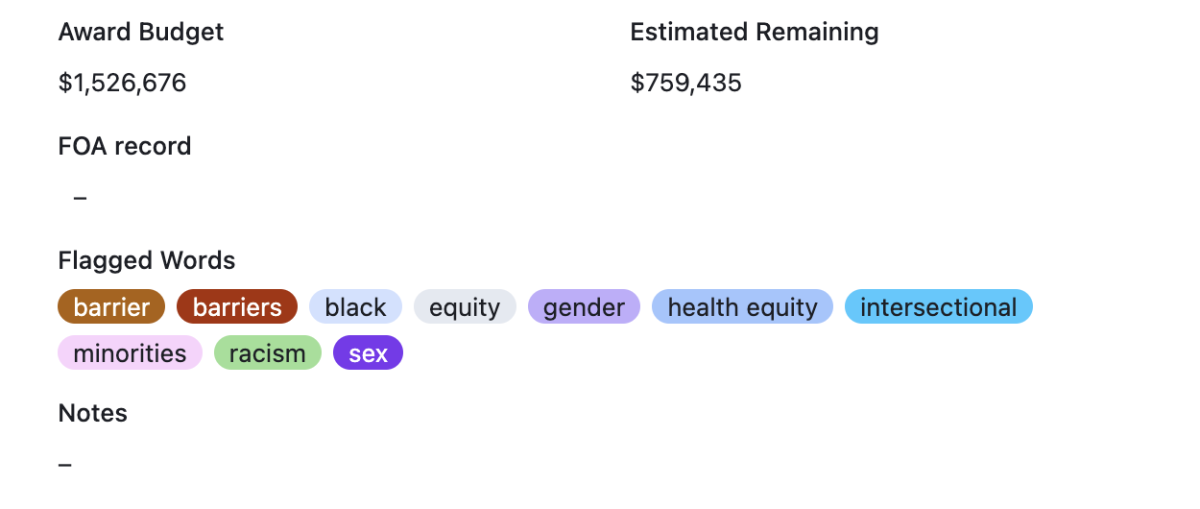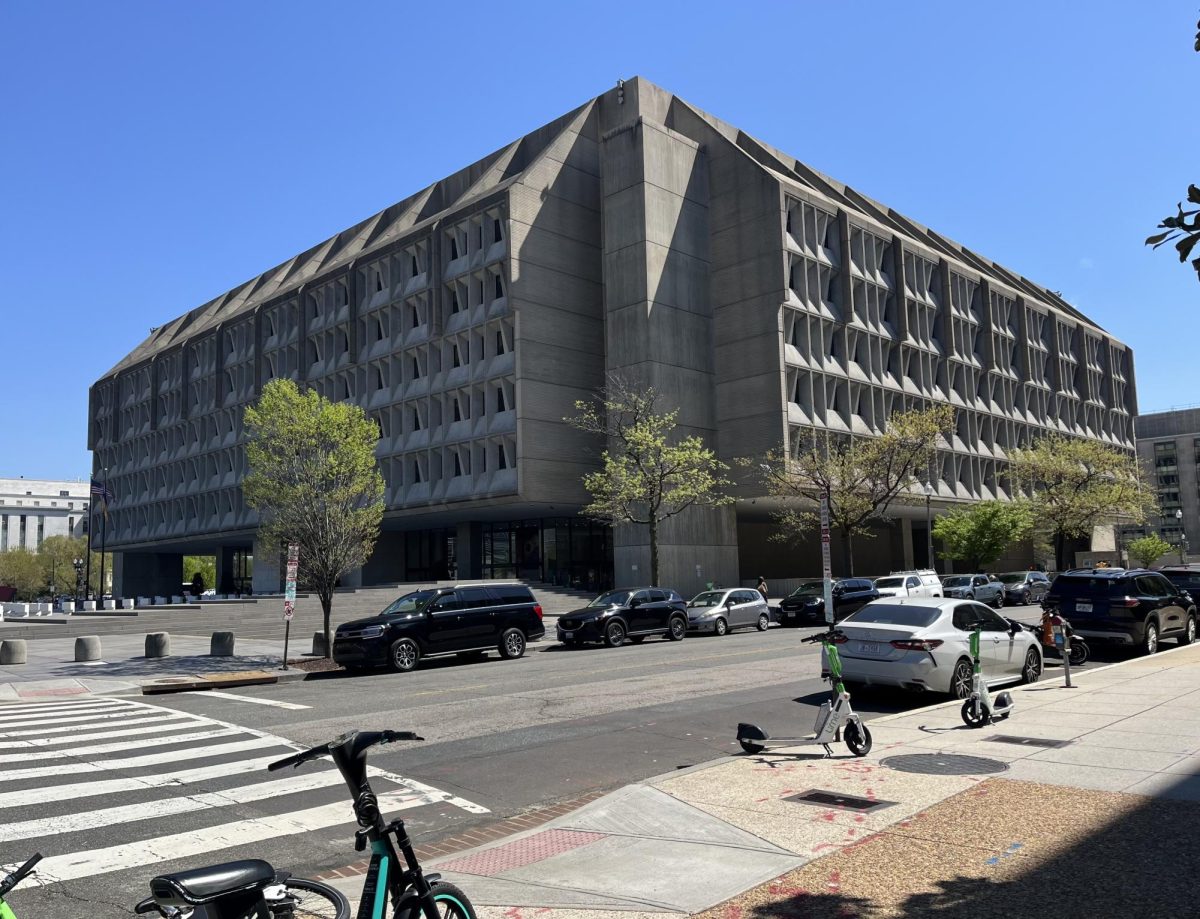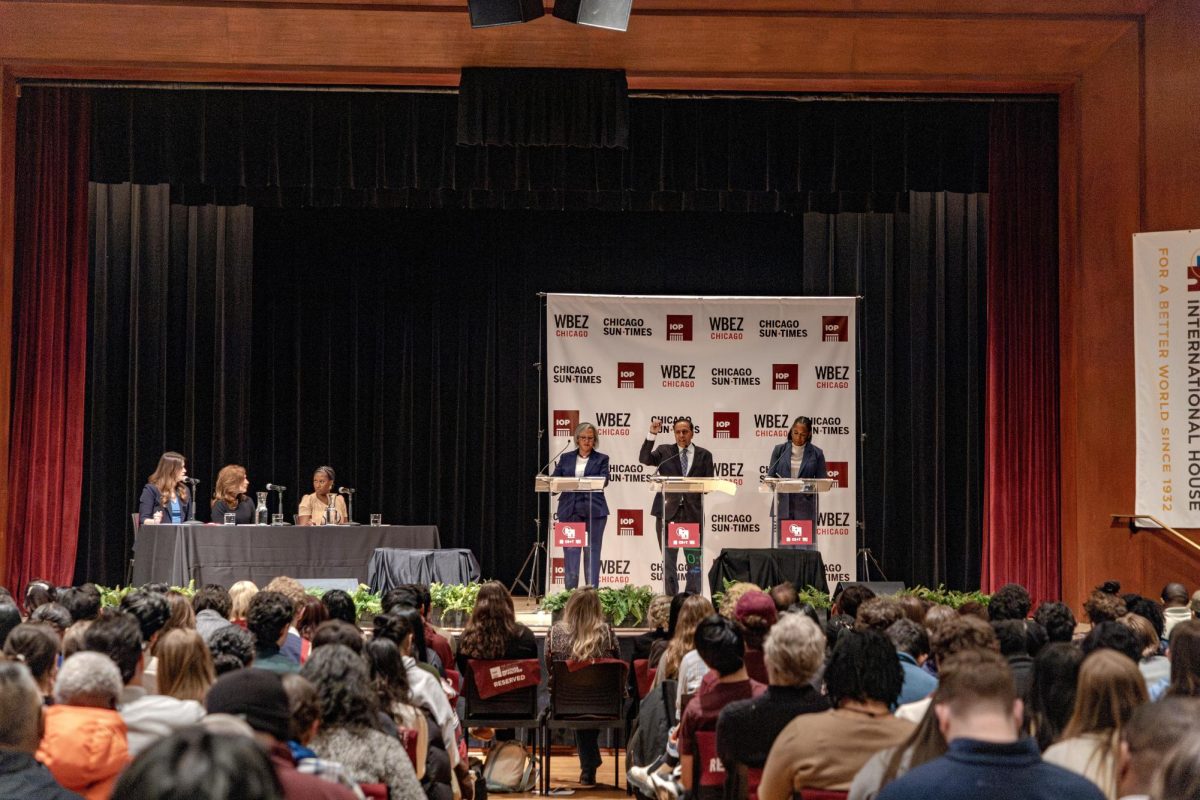The Department of Health and Human Services (HHS) in March terminated six National Institutes of Health (NIH) grants awarded to University of Chicago researchers, including funding for research into HIV/AIDS, COVID-19, and health inequality.
The UChicago grant terminations, which totaled nearly $6 million, are part of a growing list of terminated research grants awarded to universities, research labs, and public health systems. The move comes as the Trump administration continues to slash government research funding across the country, justifying the actions as eliminating diversity, equity, and inclusion programs and other “wasteful” government spending.
A January 20 an executive order titled “Ending Radical And Wasteful Government DEI Programs And Preferencing” directed federal agencies to cancel funds that “provide or advance DEI, DEIA, or ‘environmental justice’ programs, services, or activities.”
A New York Times analysis found hundreds of words that have been “flagged” to be limited or eliminated from federal websites and other government documents. Most of the terms are related to diversity, discrimination, or inequality. According to the Times, federal workers have been told to remove the words and phrases from agency materials and in some cases to “automatically flag for review” any grant proposal containing words inconsistent with the Trump administration’s priorities. A separate database compiled by Harvard University researchers lists grants terminated by HHS, including words in research proposals that may have been flagged.

In a statement, a National Institutes of Health (NIH) spokesperson told the Maroon, “NIH is taking action to terminate research funding that is not aligned with NIH and HHS priorities. We remain dedicated to restoring our agency to its tradition of upholding gold-standard, evidence-based science.”
“As we begin to Make America Healthy Again, it’s important to prioritize research that directly affects the health of Americans,” the statement read.
The NIH did not provide an explanation for why individual grants were terminated or how the affected grants were inconsistent with NIH and HHS priorities to the Maroon.
John Schneider, a professor of medicine and public health sciences at UChicago, is the principal investigator (PI) on a study retrospectively examining the increased risk of COVID-19 transmission and decreased access to testing and vaccination among migrant workers. Schneider’s team was initially awarded $374,670 by the NIH in March 2024, of which the remaining $99,409 was revoked on March 10, 2025.
Schneider told the Maroon that his study was unrelated to the HHS’s stated reason for its cancellation: that his research was ostensibly nonscientific and focused on diversity.
“We looked at the entire grant proposal and there was no mention of diversity throughout the entire research plan,” he said.
A grant termination letter reviewed by the Maroon informed the affected researcher, “It is the policy of NIH not to further prioritize research programs based primarily on artificial and non-scientific categories, including amorphous equity objectives, are antithetical to the scientific inquiry, do nothing to expand our knowledge of living systems, provide low returns on investment, and ultimately do not enhance health, lengthen life, or reduce illness.”
“Worse, so-called diversity, equity, and inclusion (‘DEI’) studies are often used to support unlawful discrimination on the basis of race and other protected characteristics, which harms the health of Americans. Therefore, this project is terminated,” the letter concluded.
Schneider is also the PI of a study looking into the relationship between cannabis use and HIV “acquisition, testing, and care” for young Black men. Initially awarded $2,814,152, HHS terminated the study’s nearly $400,000 in outstanding funding.
“We’re in year three of five… This is a multi-million-dollar grant,” Schneider said. “We’ve already spent about half of it, and so if we can’t complete it, that’s… wasted money, it’s wasted time, it’s wasted effort.”
Schneider intends to appeal the decision: “I know there are some great people who have appealed so far and have been successful, [but] I’m sure there’s a lot who have appealed and have not been successful.”
A coalition of public health groups, unions, and individual researchers filed suit against the NIH, HHS, and their respective agency heads on April 2 seeking to restore terminated research funding. Separately, 23 state attorneys general have also sued HHS and Secretary of Health and Human Services Robert F. Kennedy Jr. to have public health grants to their states restored.
A federal judge has since granted a temporary restraining order (TRO) in the states’ lawsuit.
In a statement, a University spokesperson told the Maroon, “The University of Chicago is dedicated to supporting our researcher community and the impactful, field-defining research produced across all academic disciplines. The Office of the Provost is working to help researchers identify potential alternative research funding sources where possible.”
Associate professor of medicine Jessica Ridgway, another PI whose study faces a grant cancellation, told the Maroon, “We have patients who were actively receiving care for their substance use, and we had to call them and tell them that we were not able to provide that care anymore and help try to find them alternative resources or places to go for their substance use treatment.”
Ridgway is the PI for a study looking into the overlapping challenges between substance use disorder (SUD) and HIV care among Black Americans, analyzing inadequate access to healthcare, stigma, and lack of engagement with care.
Her team aims to design and implement a strategy to increase portal engagement, perform a trial to assess the effectiveness of clinic visits, and ultimately improve SUD screening and treatment among Black people living with HIV. HHS has revoked the remaining $758,813 of Ridgway’s $1.5 million grant.
Previously, on February 7, the National Institutes of Health instituted a 15 percent cap on the “indirect costs” of research, which include administrative functions, maintenance costs, and utilities of buildings, for federal research grants.
After 22 state attorneys general sued the NIH to block the indirect funding cap, a federal judge issued a TRO on February 12 to prevent the cap from taking effect. UChicago concurrently filed a lawsuit with 12 other universities and several academic organizations, which also resulted in a TRO.
In a February 11 letter to UChicago faculty explaining the decision to sign on to the lawsuit, University President Paul Alivasatos wrote that the “precipitous timing of [the indirect funding cut] would immediately damage the ability of our faculty, students, and staff (and those of other academic institutions and medical centers across the nation) to engage in health-related fundamental research and to discover life-saving therapies.”
“I do think that we will find a way through this and past these funding cuts,” Ridgway said. “I think that you know people in the community and researchers that focus on people living with HIV are particularly resilient and are banding together. I think we’ll hopefully find… a way through. It is painful and disappointing right now.”
Nathaniel Rodwell-Simon contributed reporting.










John Welch / Apr 15, 2025 at 10:58 am
Trump and his MAGAs insist that they will control what is taught, and what researchers investigate, at American universities. They attack what we called “the life of the mind” way back in 1966, when I started at UC and at the Maroon. Yale faculty have added their names to an open letter supporting Harvard. It is time for UC faculty to stand with Harvard and against Columbia’s surrender to MAGA totalitarianism. (Yes, my Maroon followed a University style-sheet to call Chicago “UC” for short. And yes, I purposely mentioned totalitarianism to suggest that young folks read Chicago’s own Hannah Arendt)
Matthew G. Andersson, '96, Booth MBA / Apr 14, 2025 at 12:55 pm
Students and faculty might closely read University of Chicago alumnus Dr. Scott Atlas, and his fine article in the Wall Street Journal this year: “America Still Needs a Covid Reckoning: Why does nobody want to talk about the most tragic breakdown of leadership and ethics in our lifetimes?” WSJ, March 3rd, 2025, Opinion. In it, Scott goes a long way to demonstrate what the “Chicago School” means. It is not a pragmatism, or instrumentalism, but a consistent rational empiricism. A simple statistical test of significance uniformly collapses the C19 paradigm. Such interrogation was suspended or abandoned by administrative leadership. More, it reveals systematic scientific fraud across biology (and RDS research), chemistry, the medical arts, and law and economics. Scott Atlas, interestingly, is currently affiliated with Stanford, and the Hoover Institute. The answer otherwise to his Journal question is obvious.
Matthew G. Andersson, '96, Booth MBA / Apr 12, 2025 at 12:13 am
Readers need to step back and think about what the C19 program was actually about, what it continues to propagate, and what extraordinary institutional corruption occurred as a result of federally funded biosecurity research. This included conversion of university complexes into medical-behavioral experimentation centers, accompanied by medical profiteering at the administrative-governance level. C19 continues to be one of the most corrupt public-private programs within the R1 complex. Moreover, it is important to appreciate that the University of Chicago, linked to the Rockefeller Foundation and its ideological interests and influence which extend to several other major universities, has a long history of social engineering priorities including eugenics research and advocacy, and core elements of its DOD, corporate, and agency funded bio-medical and molecular engineering, have irregular weapon characteristics. See “Will Universities Ever Admit They Were Wrong About Covid Policy,” addressing UChicago alumnus Dr. Scott Atlas and his perceptive, valuable public criticism of the C19 program. See also Dissident Prof: “Covid Vaccine Pushers on Campus: A Law and Economics Explanation.” The C19 planning phase otherwise occurred during Zimmer’s administration, while the president’s office maintains narrow inter-institutional obedience to the federal health complex through financial control. Defunding is necessary though insufficient.
HyperAlum / Apr 11, 2025 at 9:08 am
Since UChicago refuses to learn in the easy way, it will learn in the hard way – no more “equity,” no more nonsense about “privilege,” no more screeching and screaming in cosplay “activism,” no more race-gender nonsense. We are back to a classical and gentlemanly approach to education. Those unable to control their id and must unleash their screeching self in disruptions about Gaza, the environment, or George Floyd, will find themselves out. The rules have changed, adapt or leave.